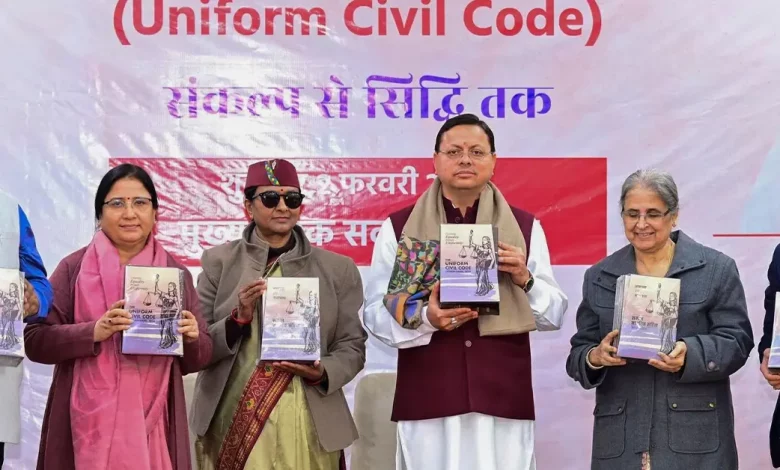Daily Current Affairs for UPSC
Uttarakhand’s Draft on Uniform Civil Code
Syllabus- Polity and Governance (GS Paper-2)

Context- The Uttarakhand Cabinet has recently approved the final draft of the Uniform Civil Code (UCC).
About the draft
- It is set to focus on gender equality by introducing provisions that treat women and men equally, especially in matters pertaining to inheritance.
- It may even revoke practices governing marriage and divorce which includes polygamy, iddat (mandatory length of waiting to be observed by women following the dissolution of a Muslim marriage) and triple talaq.
About Uniform Civil Code
- Overview : UCC is part of Part IV of the Constitution which includes the Directive Principles of State Policy (DPSP).
- Article 44 in DPSP states that “The State shall endeavor to secure for the citizens a uniform civil code throughout the territory of India”
- Background : The UCC can be traced back to the debates for the duration of the framing of the Indian Constitution.
- Some participants of the Constituent Assembly, consisting of Dr BR Ambedkar believed that a UCC was vital to promote gender equality, secularism, and national integration.
- However, many other individuals together with Nazirrudin Ahmad have been in opposition to it, claiming that the religious laws of different communities should not be tampered with, without their consent.
- Purpose : It aims to put into effect a uniform prison framework to all citizens, irrespective of their religion.
- Right now, topics which include marriage, divorce and succession are ruled by using religion-primarily based private laws.
Supreme Court’s Observations
- Over the years, the Supreme Court has deliberated upon the UCC in several judgments, however refused to issue any directive to the authorities considering that law-making falls in the exclusive domain of Parliament.
- In its 1985 judgment inside the Shah Bano Begum case, the Court discovered that “it’s miles a count number of regret that Article 44 has remained a useless letter” and referred to as for its implementation.
- Such a demand to become reiterated in next instances consisting of Sarla Mudgal as opposed to Union of India (1995), and John Vallamattom versus Union of India (2003) among others.
Need for a Uniform Civil Code in India
- A Uniform Civil Code might provide the same status to all citizens no matter the community they belong to.
- Personal laws of various religions are widely divergent and there’s no consistency in how issues like marriage, succession and adoption are handled for human beings belonging to unique groups.
- This is contradictory to Article 14 of the Constitution, which guarantees Equality earlier than the Law.
- Personal laws, due to the fact they derive from way of life and custom, also have a tendency to give undue advantage to men.
- This becomes obvious in examples including Muslim men being allowed to marry a couple of better halves, however women being forbidden from having more than one husbands.
- Men (fathers) are also handled as ‘natural guardians’ and are given desire underneath the Hindu Minority and Guardianship Act.
- A UCC could cause consistency and gender equality in India.
Criticism of UCC
- Although it reinforces equality earlier than the law, the idea of a UCC clashes with the Right to Freedom of Religion, provided beneath Article 25 of the Constitution.
- Separate personal laws are one of the approaches wherein humans have exercised their right to practice their own religion, which has been specifically essential for minorities.
- The UCC could end up a device to erode this proper, suppress minorities and homogenise way of life.
Way Forward
- A progressive and broadminded outlook must be encouraged among the people to recognize the spirit of the UCC. For this, education, awareness and sensitisation programmes ought to be taken up.
- Meanwhile, discriminatory non-public laws must be amended/abolished hence.
- The Law Commission in its file titled “Reform of Family Law” (2018) had suggested that the high-quality manner ahead could be to hold the diversity of personal laws while making sure that they do not contradict fundamental rights.
- The file cautioned that by way of codifying extraordinary personal laws, possible arrive at certain common ideas that prioritize equity rather than blanket imposition of a Uniform Civil Code.
Source: The Hindu





.png)



